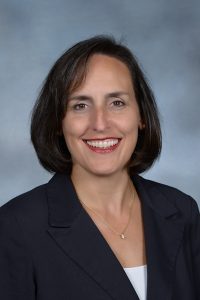Posted October 29, 2019
More than 16 percent of Kentuckians are 65 years of age or older, according to the U.S. Census Bureau. And this number is growing. From 2000 – 2010, the elderly population grew in all but seven counties in Kentucky, based on a report by the Kentucky State Data Center.
“There’s never going to be enough geriatricians to take care of all these older people in the whole state,” said KMA member Christian Davis Furman, M.D., MSPH, AGSF, the medical director of the University of Louisville Trager Institute and Interim Chief, Division of General Internal Medicine, Palliative Medicine and Medical Education at UofL.
“We’re trying to be a resource for people throughout the state who need help with geriatric, palliative care, and optimal aging issues.”
The Institute relocated to 204 E. Market St. in Louisville in September, and is home to the Republic Bank Foundation Optimal Aging Clinic.
“We now offer integrated optimal aging primary care and wellness, all in one space,” Dr. Furman said.
According to the Institute’s website, the state-of-the-art Clinic is a hub of health and wellbeing—providing everything you and your family need to maintain your health as you age as well as be your source of expert care.
The UofL Trager Institute will have an open house in the spring. For more information about the institute, visit www.tragerinstitute.org.
MOST Coalition
One way the Institute is helping Kentuckians is through their participation in the MOST Coalition. MOST stands for “Medical Orders for Scope of Treatment.” The Coalition represents state-wide stakeholders who seek to transform how Kentucky approaches end-of-life medical decisions.
They recommend Kentuckians who are facing a life-threatening medical condition complete a MOST form, a doctor’s order that helps you keep control over medical care at the end of life.
A MOST form differs from a Do Not Resuscitate (DNR) order in one important way: A MOST form also includes directions about life-sustaining measures in addition to CPR, such as intubation, antibiotic use and feeding tubes.
“It goes with the patient wherever they go—to the hospital, to the nursing home, to the emergency room, to dialysis and to the chemo infusion place,” Dr. Furman said. “We tell patients to put it on above their bed or on their refrigerator. This helps protect people who don’t want to be intubated. MOST replaces the DNR for EMS form.”
Furman said the form can be especially useful by patients who go into nursing homes. “Each nursing home has its own form,” she said. “This way, the whole state could be doing the same thing.”
Medicare now pays for advanced care planning. “If physicians want to bill for it, they must be involved for at least 16 minutes helping the patient complete the MOST form,” Dr. Furman said. “You can get paid for your time now.”
For health care professionals who would like to learn more about how to use the form, the MOST Coalition offers video conferences on the first Wednesday of every other month from 3:30 – 5:00 p.m. EST. The Coalition is seeking feedback from people around the state to see what’s working and what’s not. “We’ll go back to the Kentucky legislature and have a consensus of people across the state, it will make us have a better form,” said Dr. Furman.
For more information, visit www.kymost.org.
Project ECHO
Another way the Trager Institute offers optimal aging assistance is through Project ECHO, a bi-monthly tele-mentoring video/conference call that offers participants assistance with issues related to older adults, palliative medicine and compassionate care.
The Institute hosts a variety of Project ECHO tracks on a rotating basis. These one-hour sessions provide an interdisciplinary panel of professionals who share information about older adults—such as polypharmacy, dementia, delirium and other geriatric topics. The panel includes a geriatrician (Dr. Furman), a physician, nurses, social workers and community resource representatives. During the second half of the call, health care professionals can share their cases and seek help.
“All these doctors are taking care of older people, but some have not had the special training to do it,” Dr. Furman said. “Not that they’re not doing a good job, but there are some things that are specific to older adults that we would like to spread throughout the knowledge base of the practicing providers in Kentucky.”
“Some doctors feel isolated where they are,” Dr. Furman added. “Some of the doctor’s offices don’t have the resources—the social workers, the community agencies—it’s just a way to get everybody educated about how to take care of older adults.”
For more information about Project ECHO, visit https://www.tragerinstitute.org/project-echo


